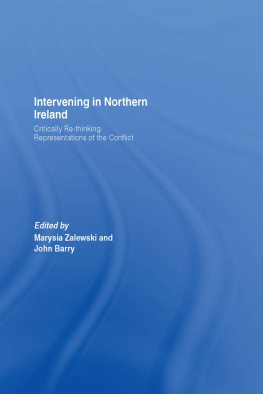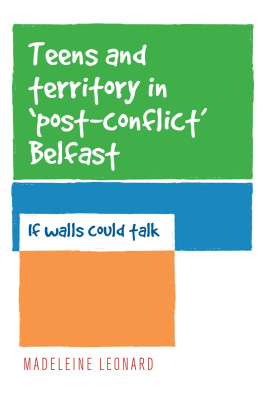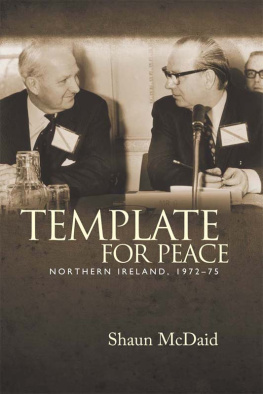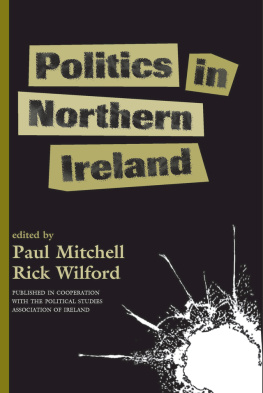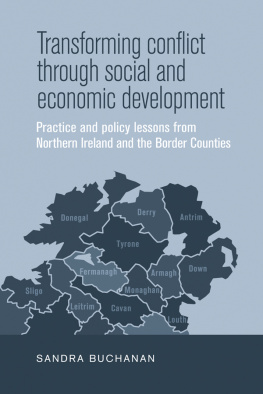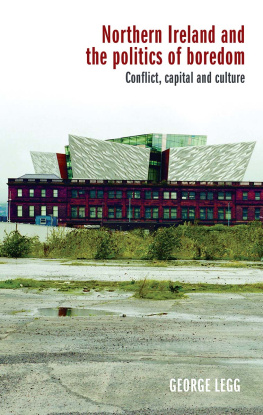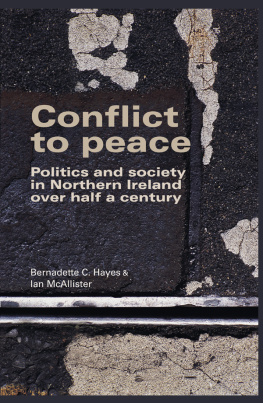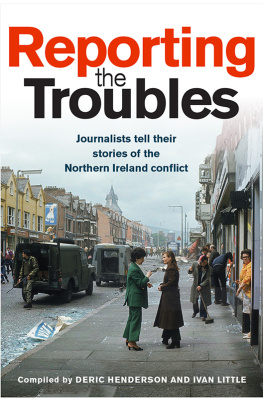Intervening in Northern Ireland
How much has academic analyses of the conflict in Northern Ireland helped us to understand it? Further, how far have academic analyses defined the parameters of the conflict? Millions of scholarly words have been produced about the conflict, yet the vast majority of them have emerged from a broadly liberal philosophical and political paradigm. This has necessarily imposed a boundary, which excludes more critical and radically inflected analyses on conflict, identities, epistemologies and politics. The articles in this special issue, drawn from a workshop hosted by the Institute of Governance, Queen's University, Belfast, explicitly engage with and challenge conventional academic analyses in order to confront the ways in which the conflict on Northern Ireland has traditionally been represented and understood. Part of the reason for adopting this approach is because it is suggested that to a certain extent, academic analyses have defined the parameters of the conflict which has necessarily had implications for the shape of ensuing solutions. A further claim is that the persistent historical and political search for causes and solutions may be constitutive of the problems that conventional analysts seek to resolve.
The articles in the first part of this book introduce and problematise traditional analyses of the conflict. Additionally these essays explain alternative approaches offering other ways of thinking about how the problem of Northern Ireland has been constituted. The second part of the book comprises essays which critically engage the conventional specifics of the political landscape in Northern Ireland; one on the neglected area of feminism; two re-considering a central feature of Northern Irish life namely the two communities, and a final essay offering a genealogical approach to the history of the troubles.
This book was previously published as a special issue of Critical Review of International Social and Political Philosophy
Dr Marysia Zalewski is Director of the Centre for Gender Studies at the University of Aberdeen, Scotland.
Dr John Barry is Director of the Institute of Irish Studies at Queen's University Belfast.
INTERVENING IN NORTHERN IRELAND
Critically Re-thinking Representations of the Conflict
Edited by Marysia Zalewski and John Barry
First published 2008 by Routledge
2 Park Square, Milton Park, Abingdon, Oxon, OX14 4RN
Simultaneously published in the USA and Canada by Routledge
270 Madison Avenue, New York, NY 10016
Routledge is an imprint of the Taylor & Francis Group, an informa business
2008 Marysia Zalewski and John Barry
Typeset in Times by Genesis Typesetting Ltd, Rochester, Kent
Printed and bound in Great Britain by MPG Books Ltd., Bodmin, Cornwall
All rights reserved. No part of this book may be reprinted or reproduced or utilised in any form or by any electronic, mechanical, or other means, now known or hereafter invented, including photocopying and recording, or in any information storage or retrieval system, without permission in writing from the publishers.
British Library Cataloguing in Publication Data
A catalogue record for this book is available from the British Library
Library of Congress Cataloging in Publication Data
A catalog record has been requested
ISBN10: 0-415-373-X (hbk)
ISBN13: 978-0-415-37314-2 (hbk)
Contents
Elizabeth Meehan
Marysia Zalewski
Section One: Thinking about the problem of Northern Ireland
Jenny Edkins
Nick Vaughan-Williams
Fiona Sampson
Alan Finlayson
Ciarn O'Kelly
Section Two: (Re)presenting Northern Ireland
Fidelma Ashe
Kathryn Conrad
Dominic Bryan
Margaret O'Callaghan
Dr Fidelma Ashe teaches contemporary political theory at the University of Ulster. Her research interests include masculinity and gender politics, devolution in the UK and Northern Irish politics. Recent publications include The Subject in Ashe et al., Contemporary Social and Political Theory: An Introduction (Milton Keynes: Open University Press, 1999); Deconstructing the experiential bar: male feminism and feminist resistance, Journal of Men and Masculinities, 7(2), 2004, pp. 205227; Gendering the Holy Cross school dispute: women and nationalism in Northern Ireland, Political Studies, forthcoming; and The New Politics of Masculinity, forthcoming with Routledge.
Dr John Barry is Director of the Institute of Governance, Public Policy and Social Research at Queen's University Belfast. His books include Rethinking Green Politics (1999), winner of the Political Studies Association Mackenzie prize for best book published in political science; Environment and Social Theory (1999); and Citizenship, Sustainability and Environmental Research (2000). His co-edited books include The International Encyclopaedia of Environmental Politics (2001), Sustaining Liberal Democracy (2002); Europe, Globalisation and Sustainability (2004), The Nation-State and the Global Ecological Crisis (2005).
Dr Dominic Bryan is Director of the Institute of Irish Studies at Queen's University, Belfast, Chair of Democratic Dialogue, Ireland's first think tank, and has worked with the Northern Ireland Human Rights Commission and the Community Relations Council. Dominic is an anthropologist researching political rituals, public space and identity in Northern Ireland. His book Orange Parades: The Politics of Ritual Tradition and Control (Pluto Press, 2000) used theories of rituals to examine parades organised by the Orange Order in Ireland. Dominic also works on issues around public order policing, human rights, ethnic politics and sectarianism and has done comparative work in South Africa and the US.
Kathryn Conrad is Associate Professor of English at the University of Kansas. Her research interests and publications have been focused primarily on gender and sexuality as categories of political and cultural analysis of Great Britain, Northern Ireland and the Republic of Ireland. Her first book, Locked in the Family Cell: Gender, Sexuality, and Political Agency in Irish National Discourse (Irish Literature and Culture Series, ed. Michael Patrick) was published with the University of Wisconsin Press, 2004. She has served as Secretary of the American Conference for Irish Studies since 1999.
Jenny Edkins is Professor in International Politics at the University of Wales Aberystwyth. Her most recent books are Trauma and the Memory of Politics (Cambridge University Press, 2003) and, with Veronique Pin-Fat and Michael J. Shapiro, Sovereign Lives: Power in Global Politics (Routledge, 2004).
Dr Alan Finlayson is Senior Lecturer in the Department of Politics and International Relations, University of Wales Swansea. A political theorist interested in analysing real politics, he is the author of Making Sense of New Labour (Lawrence & Wishart, 2003) and editor of Contemporary Political Thought: A Reader and Guide (Edinburgh University Press, 2004) and of numerous articles concerned with Northern Irish politics, British politics, media politics and theories of rhetoric.

